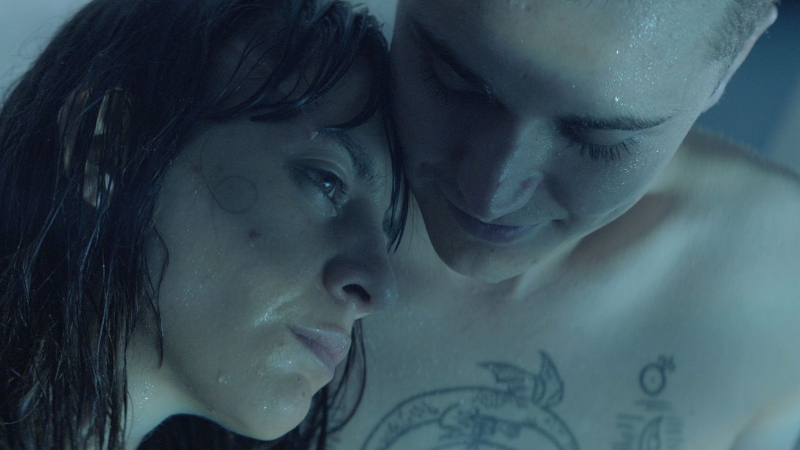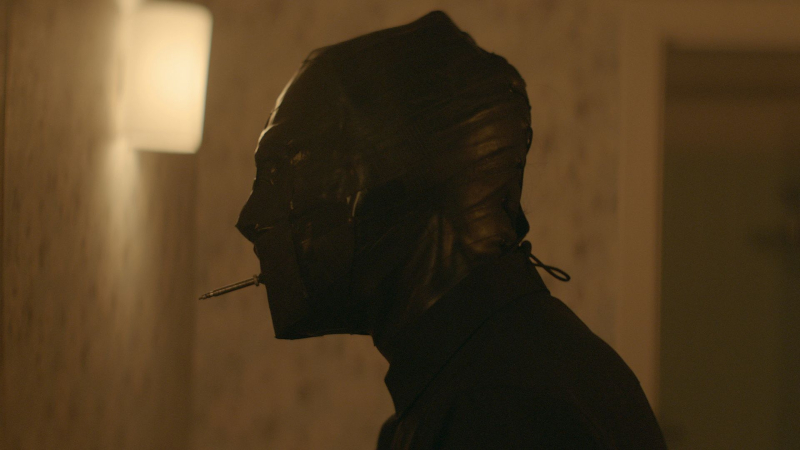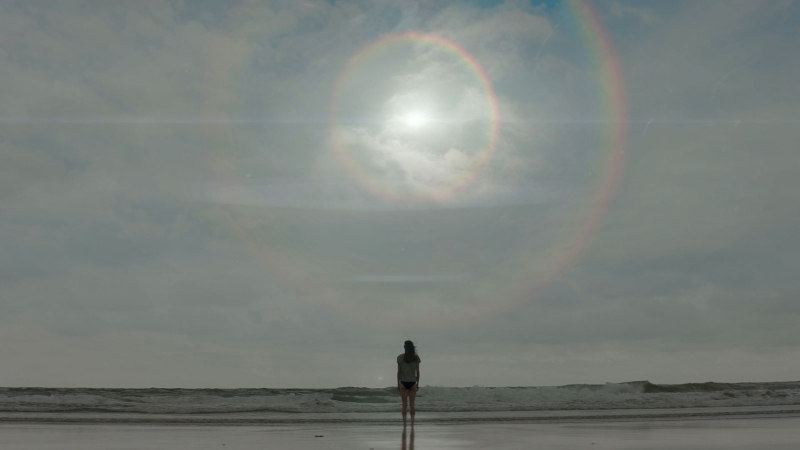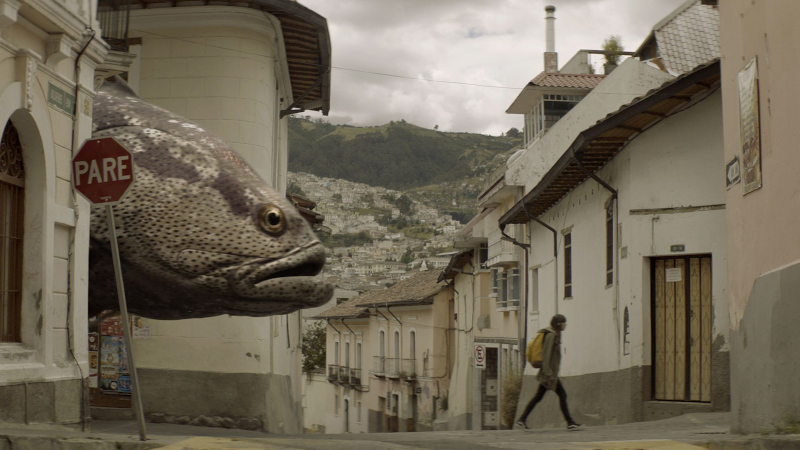Director – Javier Cutrona – 2024 – Ecuador – 105m
**
Enter the surreal world of a young woman beset by bizarre visions who believes herself followed and protected by a giant fish – premieres in the Critics’ Picks Competition of the 28th Tallinn Black Nights Film Festival
Fairly early on, in a tender, conversational, post-coital scene, her boyfriend José (Lucas Ortiz) draws an additional face on the side of that of Camila (Jessica Barahona). Visually this suggests Cubism, in which a subject’s faces would be painted from different angles simultaneously, but the dialogue between the two swiftly moves on to the subject of a god with two faces possessing the ability to look into the past and the future. (This sounds like the Roman god Janus, but if anyone name-checked him here, I must have missed it.).
The motif is echoed later when her landlord Edmundo (Pablo Aguirre), who runs (owns?) the hotel where she rents a room, is attending to the doll’s house of their rooms and maquettes of all the hotel’s residents he has made. For the maquette of Camila, he grafts an extra face onto the side of hers so that she has two. And towards the end, a shot of Camila cinematographically superimposes a second face on her, a very neat visual trick.
José works as a pizza delivery boy, and has a bike prone to not starting properly. He also has a boss who is suspicious of the fact that whenever José delivers to Camila, he takes a long time to return.

After they have made love and José has left, Camila is in the habit of keeping the pizza boxes and making diary-like notations on them in marker pen. The stack of these boxes growing in her room is effectively a pile of memories. She talks to an ant about them even as his fellow ants route march up and across her pizza boxes, a fact that doesn’t seem to worry her in the slightest. She would be lost without this repository, and issues instructions to Edmundo for the hotel maid Raquel (Marcela Campos) not to touch them when she cleans the room.
In the room across the corridor from her, in a chapter entitled The Vampire (the film is broken into numbered chapters), the occupant puts on a black, wrestling mask. He subsequently enters Camila’s room when Raquel has opened it for cleaning and steals six of the boxes. When José subsequently stops delivering pizza to Camila, she suspects foul play on the part of Alan (Alejandro Bernal), as we later learn the identity of the mask wearer to be.

Sometimes when walking the streets, Camila is followed by a large fish (maybe four times her size, although it sometimes appears in her small room as well). She also has strange visions where parts of the image bleed upwards, as if someone had discovered a really cool trick with a digital camera and thought it would look equally cool in a film.
Towards the start of the proceedings, Camila showers and blood runs down her leg into the plughole, presumably because she’s having her period. The same scene recurs later on, in a totally different context, and the apparently linear timeline of the narrative is thrown into doubt. At no point previously did it feel that we were watching a flashback. Sometimes, you see this trick in a film, and it suddenly makes things fall into place and make sense of the whole. Here, that doesn’t happen – this device simply confuses.
In scenes with Camila as a little girl, her mother talks to her about the world around her being a network that supports people and things, that everything is connected. A beautiful special effect is used to show this interconnectedness of things, which looks like a map of the stars, with lines joining the constituent parts of constellations to make shapes that have visual meaning. It must have used a sizeable part of the small budget – and you wonder exactly what was the point?

All this is an infuriating, because the film is brimming with fascinating ideas, some of them visual, others ponderously philosophical and floating around in lengthy, over-explanatory dialogue. It doesn’t seem to know how to make either its ideas or its story work on its presumably minimal budget.
It sounded so promising upfront, but in the end, this aims at a gigantic vision which it fails to realise, tripping up in the process. There is so much potential, but this ultimately doesn’t know how to get where it wants to go and overreaches itself. Which makes for frustrating viewing, to say the least.
Fishgirl premieres in the Critics’ Picks Competition of the 28th Tallinn Black Nights Film Festival which runs in cinemas from Friday, November 8th to Sunday, November 24th 2024.
This review originally appeared on DMovies.org: you can find it here.
Trailer:
Meta description: Director Javier Cutrona’s Fishgirl enters the surreal world of a young woman beset by bizarre visions who believes herself followed and protected by a giant fish.
